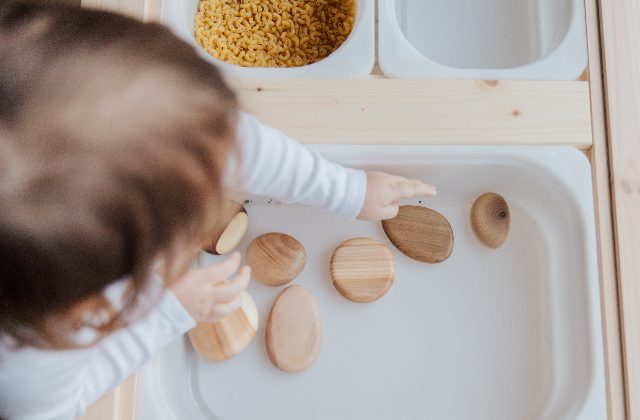
Parenting a toddler can be a difficult task, especially when they refuse to listen to your instructions or requests. As much as we would like our little ones to follow our lead, it is common for toddlers to test their boundaries and assert their independence.
While this behavior is a natural part of their development, it can also be frustrating and exhausting for parents. In such situations, it is essential to use phrases that effectively communicate your message while still respecting your child’s autonomy.
This article will explore 10 phrases to use when your toddler does not listen.

The Challenge Of Getting Toddlers To Listen
Communicating with your toddler as a parent is challenging, especially when then they are not listening. Whether it is refusing to put on their shoes or throwing a tantrum in a grocery store, getting a toddler to listen can feel like an uphill battle.
However, the way you communicate with your child can make a big difference in how they respond to you. By using positive and effective phrases, you can encourage your toddler to cooperate and make the communication process smoother for both of you.
Toddlers are still developing their communication skills and understanding of language plus they are also curious and want to explore their environment, which can distract them from listening to instructions. Additionally, toddlers may have their desires and goals, which can lead to defiance or resistance to following directions.
To overcome these challenges, it is important to communicate with toddlers in a way they can understand. This includes using simple and clear language, getting down to their level, and making eye contact. It is also helpful to give them choices whenever possible and use positive rather than negative language.
Consistency is key when it comes to getting toddlers to listen. It is imperative to establish clear expectations and consequences for not following directions and to follow through with those consequences consistently. Praising them when they do listen and follow instructions can also help good behavior.
It is important to be patient and understanding with toddlers. They are still learning and growing, and it may take time and practice for them to develop their listening skills. By using effective communication strategies and being consistent and patient, parents and caregivers can help toddlers learn to listen and follow instructions.
What To Do And 10 Phrases To Use When Your Toddler Does Not Listen.
Here are some tips to get your toddler to listen to you:
- Get down to their level: when you talk to your toddler, try to get down to their eye level. This can help them feel more connected to you and more likely to listen.
- Use a calm and firm tone: When you are talking to your toddler, try to use a calm and firm tone. Avoid yelling or getting angry, as this can make your toddler feel scared or upset.
- Use positive language: Instead of telling your toddler what not to do, try to use positive language to tell them what you want them to do. For example, instead of saying, “don’t run,” say “let’s walk together.”
- Use distraction: Toddlers can be easily distracted, so try to use this to your advantage. If your toddler is not listening to you, try to distract them with a toy or activity they enjoy.
- Use consequences: if your toddler is not listening, it is important to use consequences that are appropriate for their age. For example, you might take away a toy or activity that they enjoy if they are not listening.
Here are 10 phrases you can use when your toddler doesn’t listen:
- “I need you to listen to me right now.”
- “Let’s take a break and calm down before we continue.”
- “I cannot understand you when you are yelling, can you use your words?”
- “Let’s try that again. Can you show me how you listen?”
- “It is not okay to hit/throw things. Please stop.”
- “I understand that you are upset, but we still need to follow the rules.”
- “Let’s work together to find a solution.”
- “I need you to stop right now and listen to me.”
- “I know you want to keep playing, but it is time to come inside now.”
- “Can you please look at me when I am talking to you?”
Reasons Why Your Toddler Doesn’t Listen
There are many reasons why your toddler may not listen. Some common reasons are:
- Developmental stage: Toddlers are still developing their communication skills and may not understand everything you say. They also may not understand everything you say. Also, they have short attention spans and may get distracted easily.
- Lack of understanding: Your toddler may not understand what you are asking them to do, especially if your instructions are too complicated or vague.
- Overstimulation: If your toddler is overstimulated, they may have trouble focusing and listening to you. This can happen if they are tired, hungry, or in a noisy or chaotic environment.
- Strong emotions: Toddlers can have strong emotions, such as frustration or anger, which may make it difficult for them to listen. They may need time to calm down before they can focus on what you are saying.
- Testing boundaries: Toddlers are also testing boundaries and learning what they can and cannot do. They may not listen to you if they think they can get away with something.
- Lack of routine: Toddlers thrive on routine and structure. If their routine is disrupted or inconsistent, they may have trouble listening and following instructions.
- Health issues: If your toddler is sick or in pain, they may be irritable or have trouble focusing, which can make it harder for them to listen.
Understanding the reasons why your toddler is not listening can help you to respond appropriately and find strategies to encourage cooperation.
Choices You Can Use For Empowerment When Your Toddler Doesn’t Listen
Giving choices to your toddler can be an effective way to empower them and encourage cooperation when they do not listen. Here are some tips for giving choices.
- Offer two choices: When giving choices, it is important to offer only two options. Too many choices can overwhelm your toddler and make it harder for them to make a decision.
- Make the decision clear: Make sure that the choices you offer are clear and understandable for your toddler. For example, instead of saying “What do you want to do?” say, “Do you want to play with your toys or read a book?”
- Make both choices acceptable: Make sure that both choices are acceptable to you. This way, no matter what choice your toddler makes, you’ll be happy with the outcome.
- Allow time for your toddler to make a decision: Your toddler may need some time to think about the choices you have given them. Allow them some time to consider their options before making a decision.
- Praise your toddler for making a decision: When your toddler makes a choice, praise them for their decision. This will help to reinforce their sense of empowerment and encourage them to cooperate in the future.
For example, if your toddler does not want to put on their shoes, you might say, “Do you want to put on your red shoes or your blue shoes?” By giving them a choice, you are empowering them to make a decision and take control of the situation. This can help to encourage cooperation and reduce resistance.
How To Use Positive Reinforcement When Your Toddler Doesn’t Listen
Positive reinforcement can be an effective way to encourage good behavior in toddlers even when they do not listen. Here are some tips for using positive reinforcement:
- Be specific: Make sure your instructions are clear and specific. For example, instead of saying “Clean up your toys,” say “Please put your toys in the toy box.”
- Praise good behavior: When your toddler follows your instructions, praise them with positive feedback such as “Good job!” or “Thank you for listening.” This helps reinforce the behavior you want to see more of.
- Use rewards: Rewards can be a powerful motivator for toddlers. You can offer a small reward such as a sticker or a small toy for following instructions. Make sure the reward is something your toddler values and is age-appropriate.
- Be consistent: It’s important to be consistent with your positive reinforcement. This means praising your toddler every time they follow your instructions and giving rewards consistently.
- Avoid negative reinforcement: Avoid using negative reinforcement such as yelling, scolding, or punishing your toddler for not listening. This can hurt their behavior and can create fear and anxiety.
Remember that positive reinforcement takes time and patience. It may take several attempts before your toddler starts to listen more often, but with consistency and positivity, you’ll see progress over time.
How To Set Boundaries And Stick To Them When Your Toddler Doesn’t Listen

Setting boundaries and sticking to them is an important part of parenting. Here are some steps you can take to set and enforce boundaries with your toddler:
- Be clear and consistent: Make sure your boundaries are clear and easy for your toddler to understand. Consistency is key, so make sure you enforce the boundaries every time.
- Use positive language: Instead of saying “No,” try using positive language to communicate your boundaries. For example, “Please keep your hands to yourself” or “We don’t throw toys.”
- Follow through: When your toddler does not listen to your boundaries, follow through with a consequence. This could be a time-out, removing a toy or activity, or another consequence that fits the situation. Make sure the consequence is age-appropriate and consistent with your values.
- Stay calm: It is important to stay calm when enforcing boundaries. Reacting with anger or frustration can make the situation worse and may teach your toddler to react with negative behavior.
- Be patient: It may take time for your toddler to learn and respect your boundaries. Be patient and consistent with your approach.
Remember, setting and enforcing boundaries is an ongoing process. It’s important to communicate with your toddler, be clear about your expectations, and follow through with consequences when necessary. With patience and consistency, your toddler will learn to respect your boundaries over time.
What Happens When Your Toddler Doesn’t Listen? How To Validate Their Feelings.
When your toddler doesn’t listen, it can be frustrating and challenging as a parent. However, it is important to remember that toddlers are still developing their communication and problem-solving skills, and may not always understand or know how to follow instructions.
Here are some steps you can take to validate your toddler’s feelings when they don’t listen:
- Take a moment to understand their perspective: Try to understand why your toddler isn’t listening. Are they tired, hungry, or overstimulated? Are they having difficulty understanding your instructions? Taking a moment to understand their perspective can help you respond in a more empathetic way.
- Use “I” statements: Use “I” statements to express your feelings and needs. For example, “I feel frustrated when you don’t listen to me” instead of “You’re not listening to me.”
- Acknowledge their feelings: Acknowledge your toddler’s feelings and let them know that you understand how they feel. For example, “I know you’re feeling upset right now, but we still need to clean up our toys.”
- Offer choices: Offering your toddler choices can give them a sense of control and help them feel more empowered. For example, “Do you want to clean up your toys now or after snack time?”
- Practice positive reinforcement: When your toddler does listen to you, praise and reward them for their behavior. This can help reinforce the behavior you want to see more of.
Remember, validating your toddler’s feelings doesn’t mean giving in to their every demand. It’s important to set boundaries and expectations, but also to communicate with empathy and understanding. By doing so, you can help build a positive relationship with your toddler and promote healthy communication and problem-solving skills.
Final Thoughts
In conclusion, communication with your toddler can be challenging, but using the right phrases can make a world of difference. Remember to stay calm, be clear and specific, and use positive language when setting boundaries and enforcing rules. By using the 10 phrases to use when your toddler doesn’t listen, you can create a more positive and respectful relationship with your little one and promote healthy communication skills that will benefit them throughout their lives.
Leave a Reply
You must be logged in to post a comment.